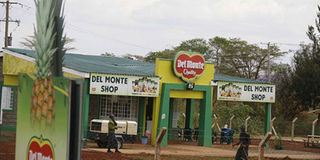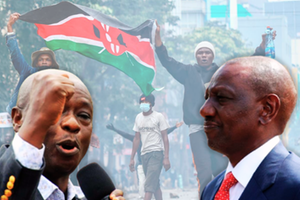Global firms scramble to entrench staff welfare

A Del Monte shop in Thika. The Environment and Lands Court in Thika has directed the National Lands Commission and the Murang'a County government to file responses to a petition seeking to block renewal of the firm's leasehold. PHOTO | MARTIN MUKANGU |
Multinationals in the agricultural sector are scrambling to set up special welfare teams amid growing pressure over employee rights abuses.
In a major shift, at least three multinationals have created welfare and human rights dockets in the wake of widespread claims of abuse of staff and surrounding communities.
On Friday, Delmonte, the Murang’a-based agricultural firm largely known for growing and processing of pineapples, announced plans to hire a human rights manager and a welfare and diversity manager, positions falling under the company’s administration department.
Human rights challenges
Part of the responsibilities of the human rights manager is to “develop a detailed action plan to address human rights challenges in the workplace and surrounding communities.”
“Implementing meaningful human rights due diligence activities, including assessing, managing, and monitoring the business’ impact on human rights, security, and the environment.
Help implement and support the company’s new grievance system (for both employees and communities) and facilitate the integration of learnings from grievance mechanisms and remedial efforts into the human rights due diligence processes,” are the other responsibilities the company has also bestowed on its human rights manager-to-be.
They will also be responsible for training and creating awareness on human rights-related topics to its workforce such as effective workplace communication, discrimination and sexual harassment.
A welfare and diversity manager, who will report directly to the company’s managing director will be charged with “managing a welfare office that is located where workers can access without fear of being spotted” and “Identifying and managing worker welfare issues such as drug abuse, alcohol abuse, HIV, and gender-based violence.”
Delmonte’s move comes weeks after reports exposing human rights abuses meted out by its guards on surrounding communities in its expansive Murang’a-based farms, and legal battles where its guards are accused of committing crimes including rape, beatings, and killings.
The company this month fired about 250 guards and started outsourcing security services from G4S in a move it termed as “aligning the company’s reputation with Human Rights Impact Assessment (HRIA) findings.”
The move by Delmonte follows a similar one by James Finlay (now owned by Browns), which hired welfare managers in its tea plantations in Kericho and Bomet counties following a BBC expose that revealed how its workers were sexually abused by officials of a firm it had contracted to provide labour.
Kakuzi, the agricultural firm based in Murang’a also had to hire former Attorney-General Githu Muigai to head its human rights reforms, following grave human rights violations by its guards on members of the surrounding Makuyu area and other communities, which led to legal battles in the UK that bled the company more than Sh1 billion.





